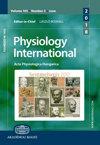Treatment of type 2 diabetes mellitus in the elderly - Special considerations.
IF 2.2
4区 医学
Q3 PHYSIOLOGY
引用次数: 0
Abstract
Type 2 diabetes is a frequent chronic disease. Given its strong positive association with older age, it is a significant public health issue in elderly populations. Furthermore, the aging of the population, driven by increasing life expectancy in high and middle-income countries leads to an increasing prevalence of diabetes.Although the same diagnostic criteria apply to the elderly and to younger people, there are unique aspects to the care for elderly type 2 diabetes patients. Both treatment goals and preferred medications, as well as non-pharmacological approaches should be adjusted in the elderly. For example, increasing the amount of physical activity may encounter difficulties, while introducing an appropriate diet may be more challenging. The patients' therapeutic adherence requires special attention due to cognitive and physical limitations. The most important treatment goal is to avoid hypoglycemia. Frailty, social and economic issues, comorbidities and the consequent polypharmacy frequently causing drug-drug interactions, as well as the increased danger of drug toxicity due to renal failure are only some of the problems that make the health care for old diabetes patients extremely difficult. Adequate care requires cooperation from a multidisciplinary team of health care professionals.Acute diabetes complications have a higher mortality in the elderly, thus close attention must be paid to avoid them. Family members should be involved in the care of elderly diabetes patients, and it is recommended to educate them on clinical signs of complications. Regular care for the patients including feedback on quality of life and early signs of health issues are essential.老年人 2 型糖尿病的治疗 - 特别注意事项。
2 型糖尿病是一种常见的慢性疾病。鉴于它与年龄增长密切相关,因此是老年人群的一个重要公共卫生问题。此外,在中高收入国家,由于预期寿命的延长,人口老龄化导致糖尿病患病率不断上升。虽然诊断标准适用于老年人和年轻人,但老年 2 型糖尿病患者的护理有其独特之处。老年人的治疗目标和首选药物以及非药物治疗方法都应有所调整。例如,增加运动量可能会遇到困难,而引入适当的饮食可能更具挑战性。由于认知能力和身体条件的限制,患者需要特别注意坚持治疗。最重要的治疗目标是避免低血糖。年老体弱、社会和经济问题、合并症以及由此导致的多种药物治疗经常引起药物之间的相互作用,肾功能衰竭也增加了药物中毒的危险性,这些只是使老年糖尿病患者的医疗保健变得极其困难的部分问题。糖尿病急性并发症在老年人中的死亡率较高,因此必须密切关注以避免并发症的发生。家庭成员应参与老年糖尿病患者的护理工作,建议向他们讲解并发症的临床表现。对患者进行定期护理,包括反馈生活质量和健康问题的早期征兆,这一点至关重要。
本文章由计算机程序翻译,如有差异,请以英文原文为准。
求助全文
约1分钟内获得全文
求助全文
来源期刊

Physiology international
Medicine-Physiology (medical)
CiteScore
3.40
自引率
0.00%
发文量
37
期刊介绍:
The journal provides a forum for important new research papers written by eminent scientists on experimental medical sciences. Papers reporting on both original work and review articles in the fields of basic and clinical physiology, pathophysiology (from the subcellular organization level up to the oranizmic one), as well as related disciplines, including history of physiological sciences, are accepted.
 求助内容:
求助内容: 应助结果提醒方式:
应助结果提醒方式:


